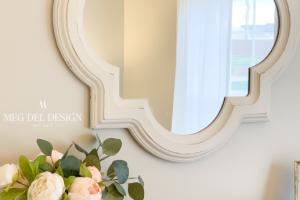Transform Your Space: The Ultimate Guide to Painting a Mirror

-
Quick Links:
- Introduction
- Why Paint a Mirror?
- Choosing the Right Paint
- Materials Needed
- Preparation
- Painting Techniques
- Drying and Finishing
- Case Studies
- Expert Insights
- FAQs
Introduction
Painting a mirror can be a unique and rewarding DIY project that not only enhances your home decor but also gives a personal touch to your living space. Mirrors are often overlooked as a decorative element, but with the right approach, they can become stunning focal points in any room. This guide will provide you with comprehensive insights, step-by-step instructions, and expert tips to successfully paint a mirror.
Why Paint a Mirror?
There are numerous reasons to paint a mirror. Here are a few:
- Customization: Painting allows you to match the mirror with your existing decor or create a bold statement piece.
- Cost-effective: Revamping an old mirror is often cheaper than buying a new one.
- Environmental Benefits: Upcycling reduces waste and gives new life to old items.
- Creative Expression: This project allows you to showcase your creativity and personal style.
Choosing the Right Paint
Not all paints are suitable for mirror surfaces. Here’s how to select the best paint:
- Acrylic Paint: Good for its durability and quick drying time.
- Chalk Paint: Ideal for a matte finish that can add a vintage touch.
- Spray Paint: Excellent for achieving a smooth, even coat without brush strokes.
Materials Needed
Before you start painting, gather the following materials:
- Mirror
- Paint (Acrylic, Chalk, or Spray Paint)
- Primer (if necessary)
- Painter's tape
- Brushes or spray can
- Drop cloth
- Protective gloves
- Mask (for spray painting)
Preparation
Preparation is crucial to ensure a successful paint job. Follow these steps:
- Clean the Mirror: Use a glass cleaner to remove any dirt or grime from the surface.
- Remove the Frame: If possible, take the mirror out of its frame to make painting easier.
- Protect the Area: Lay down a drop cloth to protect your workspace from paint splatters.
- Apply Painter's Tape: Tape off any areas you do not want to paint.
Painting Techniques
Here are different methods to apply paint to your mirror:
Brush Painting
Using a brush is ideal for detailed work and touch-ups. Follow these steps:
- Dip the brush into the paint.
- Apply the paint in even strokes, starting from one edge.
- Allow the first coat to dry before applying a second coat.
Spray Painting
Spray paint can give a smooth finish. Here's how to spray paint a mirror:
- Shake the spray paint can well.
- Hold the can about 12 inches away from the surface.
- Apply in a sweeping motion for even coverage.
- Let dry completely before adding additional coats.
Drying and Finishing
Once you have painted your mirror, let it dry thoroughly. Here are some tips for finishing:
- Check the manufacturer's instructions for drying times.
- Once dried, inspect for any touch-ups needed.
- Consider applying a sealant for added durability.
Case Studies
Let’s explore a few successful mirror painting projects:
Case Study 1: The Vintage Revamp
A homeowner transformed an old, ornate mirror with chalk paint. This allowed them to achieve a rustic look, perfectly complementing their farmhouse style.
Case Study 2: The Modern Makeover
A designer used spray paint to update a simple mirror frame, providing a sleek, contemporary finish that aligned with modern decor trends.
Expert Insights
Here are some tips from home improvement experts:
- Always test paint on a small area first to check for compatibility.
- Consider the room's lighting when choosing paint colors.
- Don’t rush the drying process; it’s key to achieving a professional look.
FAQs
1. Can I use any type of paint on a mirror?
Not all paints are suitable. Use acrylic, chalk, or specially formulated glass paint for best results.
2. Will painting a mirror affect its reflection?
It may slightly alter the reflection, but using the right paint and techniques can minimize this effect.
3. How long does it take for the paint to dry?
Drying times vary, but typically, it can take 1-2 hours for a coat to dry, and 24 hours for full curing.
4. Do I need to prime the mirror before painting?
Priming is not always necessary but can enhance adhesion and durability, especially for non-porous surfaces.
5. Can I paint a mirror frame without painting the mirror itself?
Yes! You can simply tape the mirror edges and paint the frame to update its look.
6. How can I remove paint from a mirror?
Use a paint remover or a glass scraper to carefully remove excess paint. Always follow safety instructions.
7. Is it safe to paint a mirror?
Yes, as long as you use non-toxic paint and follow safety precautions, like wearing masks and gloves.
8. What is the best method for painting a large mirror?
Spray painting is often the best method for large mirrors as it provides an even coat without brush strokes.
9. Can I use spray paint indoors?
Yes, but ensure proper ventilation and wear a mask to avoid inhaling fumes.
10. How can I ensure a smooth finish?
Applying multiple thin coats of paint and allowing adequate drying time between layers can help achieve a smooth finish.
Random Reads
- How to restore google authenticator
- How to restore deleted contacts on android
- How to reformat external hard drive
- How to refinish brass
- Mastering autocad scale designs
- How to remove stuck document from windows printer queue
- Scan qr codes from pictures
- Samsung tv red light flashing
- How to shoot yourself in grand theft auto 5
- How to show image previews windows 10 11